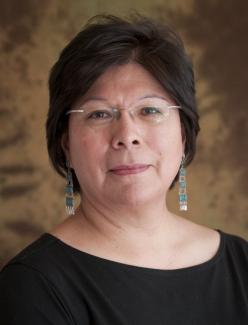
It is fitting that this issue of the CSQ on Indigenous women’s leadership coincides with my departure from my position as the executive director of Cultural Survival. As an Indigenous woman leader who has advocated and fought for Indigenous rights, environmental and social justice, and the rights of women and children, the work of the women in this issue is important to me. I truly honor all women and the many others who are impassioned to these issues and are leading the way to the self-determined future for all Indigenous Peoples.
Globally, many brave and courageous Indigenous women are on the frontlines defending and fighting for Indigenous land and resource rights since they directly depend on these to survive. Indigenous women are crucial in maintaining ecological balance to ensure local food security. Recognizing and securing land rights benefits Indigenous women in providing for their families and communities. Indigenous women are warriors, nurturing, protecting, and ensuring life. All of the Indigenous women providing activist leadership in this issue address key challenges affecting Indigenous women. We only have to look to a few, such as Pratima Gurung (Gurung), who is spearheading advocacy for Indigenous women with disabilities in Nepal and speaks of the needs for Indigenous women’s meaningful participation at all levels. Rukka Sombolinggi (Toraja), who was elected the first woman secretary general of the Indigenous Peoples’ Alliance of Indonesian Archipelago, advocates for the recognition of Indigenous women’s rights to land use and management. Shanice Appels, a South African Khoe activist, is advocating and fighting for justice in reclaiming and securing land for farmworkers, especially women farmworkers. And Naomi Lanoi (Maasai), a program officer for the Kenya Land Alliance, discusses how resource extraction disproportionately affects rural women and leads to violence against women. She advocates for the participation of women “in essential decisionmaking processes about the use, management, and political oversight of Kenyan land.” We have much more work to do as evidenced by the world’s current state of affairs and those leaders who would incite violence, oppression, racism, and genocide. As Indigenous Peoples, we are strong and resilient and our fight will continue.
As I conclude my final executive director letter, I would like to extend an appreciation to the Cultural Survival Board of Directors and staff. I could not have done this job without their strength and dedication. I would also like to make special mention of the late Sarah Fuller, former president of the Board, who was also my friend and mentor. Cultural Survival has been an amazing international advocacy platform and network for me to help advance the rights of Indigenous Peoples. In addition, thank you to the many friends and allies for your support of Cultural Survival. We are currently conducting a search to find Cultural Survival’s next executive director. During this transition period, Mark Camp, deputy executive director, will serve as interim executive director.
To all my relatives, our friends, and allies around the world, Ahe’hee’ (Navajo for “in appreciation”) for the opportunity to serve you.
In Solidarity,
Suzanne Benally, Executive Director
(Navajo and Santa Clara Tewa)
